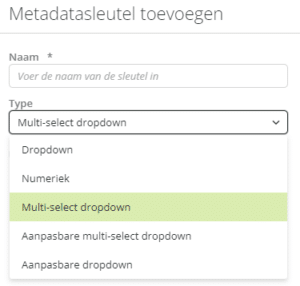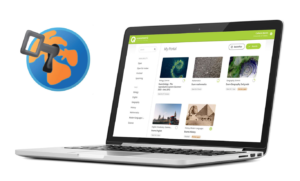21st-century skills
21st century skills is a collective term for 11 skills that prepare students for digitisation and the rapid growth of technology in our society. These include critical thinking, basic IT skills, computational thinking and media literacy.
Access code
In assessmentQ, an access code is a unique code that provides direct access to a particular session for a specific participant and a specific assignment. This mean that participants are not required to log in to assessmentQ first. Participants can only use their access code once to undertake their assignment. If a feedback period is provided, participants can use their access code to view their assignment afterwards in read-only mode.
Adaptive learning
Adaptive learning is based on the individual differences between students, tailoring their education to their interests, strengths and needs. This form of education plays an important role in traditional innovative education and in concepts such as Experiential Education and Development-Oriented Education.
Assignment
In practice, there are three types of assignments: exercises, exams and SCORM assignments.
- Exercises are intended to allow users to practice and learn from any mistakes. Exercises can be repeated several times. When completing an exercise, users can view the answer and any feedback at item level as standard. Practice tests (mocks) are also usually categorised as exercises.
- Exams are used to test the end user’s knowledge on a given subject. Exams can only be taken once. When taking an exam, the correct answer is not shown.
- SCORM assignments are exercises or tests that are imported into assessmentQ from another external system that meets SCORM standards (Shareable Content Object Reference Model).
Back office
The assessmentQ back office is the part of the platform that is only visible to the people involved in organising and following up set tests or exercises, and therefore inaccessible to the candidates themselves. Authors can use the back office to formulate questions (items) and create assignments, invigilator can use it to supervise exams in real time, and evaluators can correct answers to open-ended questions or copy scores.
Display mode
Display mode is a way to display the same given information via a different visual appearance, usually with a different colour scheme. Certain display modes can help those with visual impairments view the information more clearly, thereby rendering any given application more accessible to such candidates. In assessmentQ, candidates can choose between three display modes: standard view, dark mode and high contrast mode.
E-assessment
E-assessment or digital assessment is the online version of an assessment. It allows candidates to do complete exercises or tests online, either at home or in another controlled environment.
Evaluation
Evaluations entail human evaluators determining the final score for particular answers. This method is usually employed for open-ended questions, where candidates are required fill something in, write text or create a recording. These questions cannot be automatically corrected with the same degree of certainty as closed questions (such as multiple choice). In other words, the human evaluator has the final say here.
Formative evaluation
 Formative evaluation, also known as assessment for learning, involves checking learners’ progress against pre-determined learning goals. Teachers provide feedback and input so that learners can teach themselves how to reach their desired learning goals.
Formative evaluation, also known as assessment for learning, involves checking learners’ progress against pre-determined learning goals. Teachers provide feedback and input so that learners can teach themselves how to reach their desired learning goals.
Highlighter
A highlighter is a tool that allows candidates or students to mark text within assessmentQ, with the highlighted text having different background colour. Highlighting keywords can make texts easier for candidates to understand or help them retrieve essential information more quickly.
Hybrid learning
Hybrid learning is the combination of online and offline learning. While part of the group will follow the lesson online, others will attend face-to-face. Hybrid learning is not to be confused with blended learning. The latter is a combination of different types of learning, such as theory and practice, independent study and group work.
Item bank
An item bank is where you, as an author, bring together all the questions (items) – possibly with attributes (labels, tags, metadata, keywords) – to create exercises or tests. You can quickly select questions, easily create multiple versions and ensure your questions are properly distributed within the item bank.
LaTeX
LaTeX is a software system used to create technical texts such as papers and exams. The system is popular within the scientific community and available for almost all computer systems. In assessmentQ, it can be used to incorporate mathematical or chemical formulae within questions.
Learning gain
Learning gain is the increase in an individual or a group’s knowledge, skills and competences over a given learning period.
LMS
A learning management system (LMS) helps you organise the education on offer within a particular organisation. For example, an LMS can keep track of which training courses a particular pupil or employee has taken, is taking or is planning on taking in the future. Sometimes, employees can choose which courses they wish to take to either improve their existing skills or acquire new ones. Read more about the difference between an LMS and assessmentQ.
Metadata
 Metadata describes the characteristics of other data. A document’s metadata includes its author, language, publication date and the number of pages. Linking metadata to its related data helps to make it easier to find this data using search engines.
Metadata describes the characteristics of other data. A document’s metadata includes its author, language, publication date and the number of pages. Linking metadata to its related data helps to make it easier to find this data using search engines.
Microlearning
Microlearning is a supplement to traditional e-learning, where learners acquire certain skills through relatively small, short learning units. Examples might include holding interviews, giving presentations or mastering technical tools.
Multistage adaptive test
Multistage adaptive tests (MSAT) are similar to adaptive tests in that the difficulty levels of such tests are dynamically tailored to each student. Whereas adaptive testing works by adapting each item (question) in turn by means of item response theory, the multistage approach tackles blocks of items (questions).
Offline support (degraded mode)
Offline support makes it possible to complete exercises or take tests in assessmentQ with no technical hitches, even if the candidate’s internet connection is unstable or intermittent. When assignments are completed with offline support, an internet connection is only required at the beginning (to download the assignment) and when finishing the assignment (to upload the scores).
Offline package
An offline package is a downloadable application (in .exe format) that contains three things:
- The assignment(s) for candidates
- The access codes for the candidates
- The offline assessmentQ player
Offline packages allow you to organise exams in assessmentQ without an internet connection. Following the exam, the candidates’ results are stored in an encrypted file on the candidate’s computer (.aqr format). Once the computer is reconnected to the internet following the exam, the score is uploaded to assessmentQ.
Portal
The portal is the page in assessmentQ where users see all the assignments available to them (i.e. exercises and tests) and from where they can launch said assignments.
Proctoring
Proctoring means invigilation. In addition to real-life supervising of candidates, online proctoring allows remote monitoring of tests and exercises. Online proctoring has become considerably more popular since the Covid-19 pandemic. The basic requirements are adequate hardware and a stable internet connection.
Psychometrics
Psychometrics is an area of social science concerned with techniques of measuring psychological phenomena such as knowledge, skills, attitudes, traits and personal characteristics. Typical psychometric measurement tools include intelligence quotients (IQ) and standardised literacy and numeracy tests. Learn more about psychometric values.
Rubric
A rubric is a feedback and assessment tool that usually takes the form of a pre-filled table. Rubrics are more detailed than simple scores or grades, thereby ensuring a more objective, consistent evaluation. Read more about the use of rubrics.
SaaS
Software as a Service (SaaS), also known as Software on Demand, is software that is offered as an online service. Customers do not purchase the software. Instead, they sign a contract per month and per user, for example. The provider is responsible for the installation, management and maintenance of the software.
Safe Exam Browser (SEB)

A Safe Exam Browser (SEB) is a free browser in which you can safely take online tests. The software prevents candidates from consulting unauthorised sources during tests or exams, such as certain websites or applications.
Scenario
A scenario is basically a blueprint for an exercise or exam, allowing an author to create an assignment that complies with certain predefined rules. By using a scenario, the author can also easily create multiple equivalent variants of an assignment.
Session
A session is one attempt by a given candidate to complete an exercise or take a test. The session starts when the candidate begins the exercise or test, ending when they submit their exercise or test, when the time limit is reached or when the invigilator or teacher ends the session. The candidate achieves a specific score for each session in assessmentQ.
Single sign-on (SSO)
Single sign-on (SSO) is an authentication tool used to access several applications and services securely using a single set of login data. Instead of using a different password for each application or service, you can instead log in anywhere and at any time using a single password.
Summative evaluation
Summative evaluation, also called assessment of learning, checks whether learners have achieved the learning goals to a sufficient extent. The assessment usually comprises a grade, often holding an important consequence for the learner, such as receiving credits or qualifications.
Assignment template
The assignment template enables you to determine the appearance, navigation and behaviour of an assignment or exam in assessmentQ. Only administrators can create assessment templates.

Let’s talk!
Schedule a short call with one of our experts, free of obligation. They will be happy to listen to your needs.

